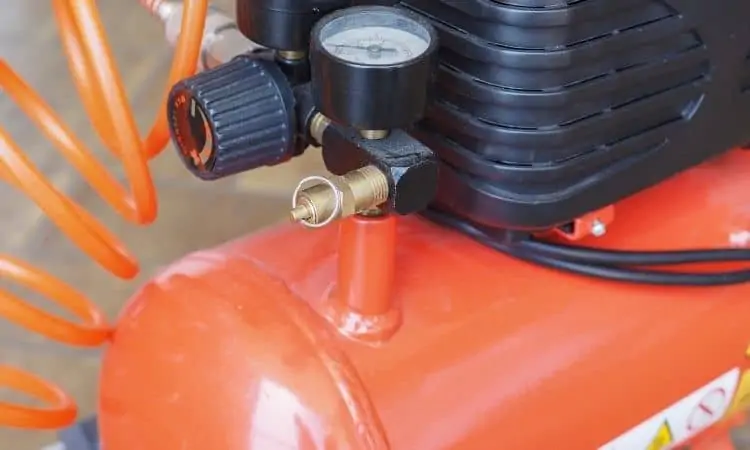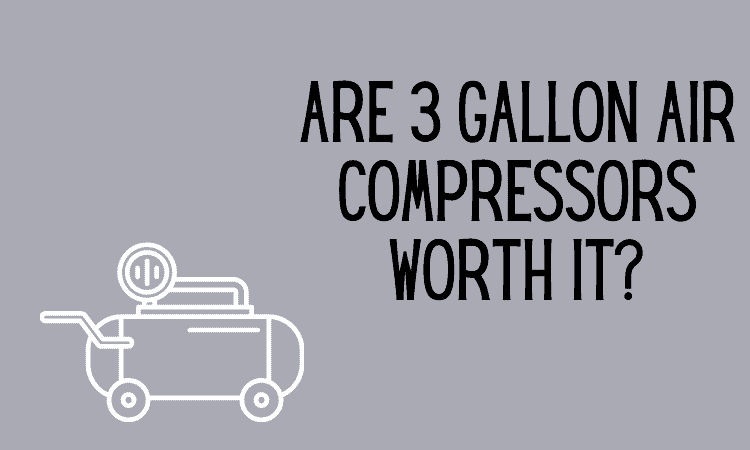Shopping for a small air compressor can be a more complicated endeavor than it might appear. One of the things that throw a lot of people off is tank size. There’s a fine balance to be found between portability and versatility. One of the most popular sizes for small air compressors is the 3-gallon tank. But many people wonder if they’re powerful enough to be worth it.
So in this article, I’ll tell you everything you need to know about 3-gallon air compressors so you can make an informed decision. I’ll even make a recommendation for the best model on the market.
Table of Contents
- What Can 3-Gallon Air Compressors Be Used For?
- Will a 3-Gallon Air Compressor Run an Impact Wrench?
- Will a 3-Gallon Air Compressor Fill a Car Tire?
- How Long Does It Take for a 3-Gallon Air Compressor To Fill?
- Typical CFM, PSI, and HP Ratings of 3-Gallon Air Compressors
- How Long Do 3-Gallon Air Compressors Last?
- How Much Should I Spend On a 3-Gallon Air Compressor?
- Are 3-Gallon Air Compressors Worth It?
- Our Pick for the Best Overall 3-Gallon Air Compressor
- 3 Gallon Air Compressors FAQ’s
What Can 3-Gallon Air Compressors Be Used For?
Most 3-gallon air compressors can only be used for light-duty air tools and inflating tires or sports equipment. They don’t work well for continuous use or high-power air tools. What tools they can run depends on their CFM (cubic feet per minute) output and PSI (pounds per square inch) capacity.
Most 3-gallon air compressors have relatively low CFM and PSI ratings. We’ll delve into this more later, but what this essentially means is that the air output is not very powerful, nor does the tank refill very quickly. The small storage tank will also be depleted fairly quickly.
In practical terms, this means that a 3-gallon air compressor typically won’t provide enough air to run most pneumatic tools (at least not very well) and you’ll frequently find yourself waiting for the tank to refill when performing tasks that require a lot of air. All this to say, 3-gallon compressors aren’t all that versatile.
A few common uses for 3-gallon air compressors include:
- Inflating relatively small tires (on bicycles, wheelbarrows, etc.)
- Inflating sports balls and other inflatable items
- Nail guns & staple guns
- Air blower guns (light-duty)
- Hobby/craft painting (light-duty)
Will a 3-Gallon Air Compressor Run an Impact Wrench?
Generally speaking, a 3-gallon air compressor will not be able to run an impact wrench. Even smaller impact wrenches require 1 to 1.5 CFM to operate properly and most 3-gallon compressors only provide around 0.5 CFM. The wrench will be weak and the tank will need to refill too frequently.
Will a 3-Gallon Air Compressor Fill a Car Tire?
A 3-gallon air compressor will be able to fill most car tires with no problem. If filling a tire from empty, it may take more than one tank of air, depending on the tire size – but it will get the job done. The only case where it may not work is if the tire’s PSI exceeds the compressor’s max PSI.
How Long Does It Take for a 3-Gallon Air Compressor To Fill?
It typically takes anywhere from 1 to 3 minutes for a 3-gallon air compressor to fill the tank to maximum (“cut-out”) capacity from empty. The time it takes to “recover” (refill during use) is usually ~45 seconds. The exact times will depend on the model, its CFM rating, and its maximum PSI rating.
Air compressors have a cut-out pressure and a cut-in pressure. Cut-out pressure is the maximum PSI rating for the tank (usually around 100 PSI on 3-gal. models). When the tank pressure reaches the cut-out, the pressure switch turns off the pump. Then, when the tank is drained to the cut-in pressure (usually around 30 PSI), the pressure switch turns the pump back on. This is why it takes less time to “recover” than it does to fill from empty.
Typical CFM, PSI, and HP Ratings of 3-Gallon Air Compressors
To find out if an air compressor will serve your purposes, you’ll want to keep an eye on a few key specifications – CFM, PSI, and HP.
CFM
As mentioned above, CFM stands for cubic feet per second. It is also often called SCFM – standard cubic feet per minute. This measurement basically refers to the flow rate of your compressor’s pump (i.e. its air output) at a given pressure. For instance, a typical 3-gallon air compressor may produce 0.5 CFM @ 90 PSI or 1 CFM @ 40 PSI.
As we learned earlier, the CFM rating is an important factor in determining what tools and applications you can use your compressor for.
The most common CFM rating for a 3-gallon air compressor is between 0.5 and 1. However, some models boast CFM ratings as high as 2.6.
PSI
PSI (pounds per square inch) refers to the air tank’s maximum pressure – the pressure at which the pump automatically shuts off. Most 3-gallon compressors are rated for around 90 to 150 PSI, with 110 PSI being the most common. This is adequate for most tools and purposes – provided that the CFM is high enough.
HP
HP, of course, stands for horsepower. Motor horsepower is mainly important for the level of CFM it can provide. The higher the horsepower, the higher the CFM tends to be. But it can also play a role in power consumption and noise levels – generally speaking, the higher the horsepower, the more power the motor will draw and the louder the pump will be.
Typical 3-gallon compressors feature anywhere from 0.33 to 1.5 HP motors. Most tend to be in the lower range – ⅓-HP motors are very common.
How Long Do 3-Gallon Air Compressors Last?

A 3-gallon air compressor will typically last anywhere from 10 to 15 years with proper care and maintenance. How often you use it and how long you use it at one time also play a part in how quickly it wears. Using a 3-gallon compressor continuously for long periods may degrade the motor.
Since most 3-gal. compressors are oil-free, they’re pretty low-maintenance – but you’ll still have to keep it clean, keep it dry, and keep up with basic maintenance tasks if you want it to last.
How Much Should I Spend On a 3-Gallon Air Compressor?
You should expect to spend anywhere from $60 to $250 for a 3-gallon air compressor. The average price for a quality brand-name model is around $150. The more expensive models tend to have enhanced features such as noise reduction and higher CFM ratings, while cheaper models tend to be less powerful.
Some people swear by the cheap 3-gallon compressor they picked up at their local hardware store, while others need a little more oomph and versatility (and a trusted brand). But in terms of overall quality, power, and longevity, you do tend to get what you pay for. At the end of the day, how much you want to spend is primarily a matter of what you intend to use the compressor for and what kind of features/specifications you need.
Are 3-Gallon Air Compressors Worth It?
If you want a decent portable compressor for topping off tires and powering light-duty air tools, a 3-gallon air compressor is worth it. Despite its limitations, it can be a handy tool to have around. But if you want to do more than just the basics, you’re better off with a more powerful model.
Whether or not a 3-gallon air compressor is worth it to you is ultimately a matter of what you’re after. The low CFM and tank capacity will limit what you can use it for, but it can handle most basic DIY tasks. If you want a compressor for your garage or workshop that you can use for big paint jobs, grinding, cutting, sanding, or automotive repairs, you’ll need a significantly larger compressor with a high CFM (5+).
That being said, some 3-gallon models do offer higher CFM and PSI ratings if you’re willing to spend a little extra. But if you just want an occasional-use compressor for minor tasks, a cheaper model should do the trick.
Our Pick for the Best Overall 3-Gallon Air Compressor
We’ve chosen the 3-gallon air compressor that we think is the best on the market based on price, customer reviews, brand reputation, and overall value.
Craftsman 3 Gallon 1.5 HP Air Compressor
This air compressor from Craftsman, one of the most trusted names in tools, blows most 3-gallon compressors out of the water. With a 1.5 horsepower motor, it can provide 2.6 CFM @ 90 PSI and 3.7 CFM @ 40 PSI, making it vastly more powerful than most compressors of the same size. It also has a max pressure of 155 PSI, which is most commonly found with compressors twice its size.
Its compact design, lightweight hotdog-style tank, and steel carry handle with rubber grip make it ideal for easy transportation and convenient storage. The motor is oil-free, which also makes for minimal maintenance.
Its streamlined interface features a tank pressure gauge, tool pressure gauge, pressure regulator knob, and standard ¼-inch quick coupler. The pressure relief valve and tank drain valve are both easily accessible and the rubber feet help prevent movement due to vibration.
At around $180, the price is a bit high compared to most other 3-gallon compressors. But considering the extra power and PSI rating, this compressor has outstanding value.
Best 3 Gallon Air Compressor
Features
- Oil-free 1.5 HP motor
- 2.6 CFM @ 90 PSI, 3.7 CFM @ 40 PSI for fast recovery & enhanced performance
- 155 PSI max tank pressure
- 125-155 PSI tool pressure range
- Portable & lightweight with reinforced carrying handle
- 120V electric pump
- 6-foot power cord
- 1x quick coupler (¼-inch)
- 1-Year limited warranty
3 Gallon Air Compressors FAQ’s
What is the maximum pressure that a 3-gallon air compressor can reach?
The maximum pressure that a 3-gallon air compressor can reach depends on the specific model, but most 3-gallon compressors have a maximum pressure of around 100-120 PSI (pounds per square inch).
How noisy are 3-gallon air compressors?
The noise level of a 3-gallon air compressor varies by model, but generally, they are relatively loud. They can produce noise levels of around 60-80 decibels (dB), which is equivalent to the noise level of a vacuum cleaner.
Can a 3-gallon air compressor power multiple tools simultaneously?
It depends on the specific compressor model and the tools you are using. Most 3-gallon compressors have a single air outlet, so you can only use one tool at a time. However, if the tools require a low airflow rate, you may be able to use multiple tools simultaneously.
What maintenance is required for a 3-gallon air compressor?
Regular maintenance is essential to keep your 3-gallon air compressor running efficiently. You should check the oil level and change it every 3-6 months, clean or replace the air filter every few uses, and drain the water from the tank after each use. It’s also important to periodically inspect the hoses and fittings for any damage or leaks.



